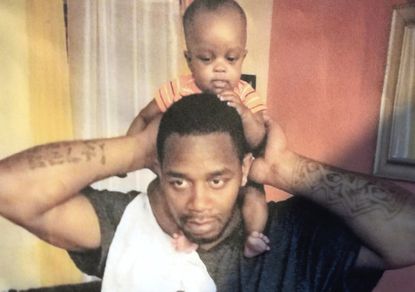An NYPD administrative law judge has recommended dismissal of disciplinary charges against a cop who fatally shot an unarmed driver in a Brooklyn road rage clash nine years ago, the Daily News has learned.
Rosemary Maldonado, the department’s deputy commissioner for trials, concluded that because Officer Wayne Isaacs was off duty when he shot Delrawn Small on July 4, 2016, in East New York, the Civilian Complaint Review Board does not have jurisdiction to pursue the case.
The legal precedents underlying the CCRB assertion it could prosecute an off-duty cop were based on the fact that officers in those prior cases explicitly invoked their police powers. Isaacs, Maldonado concluded, did not.
The decision, if endorsed by NYPD Commissioner Jessica Tisch, could effectively end the disciplinary case just nine days before Isaacs was scheduled to go on administrative trial at police headquarters after a remarkably protracted legal battle waged across the tenures of seven police commissioners.
NYPD Officer Wayne Isaacs leaves court during a break between the defense and the peoples cross exam
But the CCRB argued Monday there is a contradiction in Maldonado’s decision because Isaacs had claimed he was acting as a cop to obtain city legal representation in a separate civil lawsuit filed by Small’s family.
“Deputy Commissioner Maldonado is recommending the case be dismissed because PO Isaacs allegedly didn’t invoke his authority as a police officer during the encounter, despite having claimed that he acted as a police officer when sued by Mr. Small’s family,” said Dakota Gardner, a CCRB spokesman.
“Commissioner Tisch has said she takes her commitment to discipline seriously, and we are confident she will overrule DCT Maldonado and will let this case proceed to trial.”
The CCRB also argued Isaacs invoked his police powers by using his NYPD-issue service weapon in the shooting.
Patrick Hendry, president of the Police Benevolent Association, cast the case as a referendum on the broader authority of the CCRB.

“We are glad that the trial commissioner has struck down yet another attempt by CCRB to bend the law and increase its own power,” Hendry said. “CCRB’s constant overreach into matters beyond its jurisdiction isn’t an accident — it is part of a coordinated campaign to take full control of the NYPD.”
Small’s siblings, Victoria Davis and Victor Dempsey, immediately blasted the decision.
“For over nine years, every part of this system has worked overtime to protect Officer Isaacs at our family’s expense,” they said in a statement.
“Let’s be clear: this latest recommendation to dismiss charges isn’t about ‘jurisdiction’ – it’s a bogus, manufactured excuse to protect a murderer in uniform. And it’s just the latest example of how the NYPD, the police unions, the courts, and city agencies bend over backwards to deny every shred of accountability.”
Small, 37, was with his infant son, step-daughter and girlfriend when his car was cut off several times by Isaacs.
Small, who was unarmed, crossed two lanes of traffic to confront Isaacs in his car on Atlantic Ave. near Bradford St. Almost as soon as he reached Isaacs’ window, the officer shot him three times, striking him in the chest.

New York City students and youth activists participate in a 2019 news conference and rally to commemorate the lives of Eric Garner and Delrawn Small, both of whom were killed by police in different incidents. (Spencer Platt/Getty Images)A long legal battle followed in several different courts. First, Isaacs was charged and tried by the state Attorney General’s office as the first case prosecuted by that office under then-Gov. Cuomo’s executive order giving the AG’s office the power to investigate police-involved deaths.
Isaacs, who maintained he acted in self-defense, was acquitted of murder and manslaughter at trial in November 2017. The NYPD’s Force Investigation Division then cleared him following an investigation and then-Police Commissioner James O’Neill signed off in 2018.
In October 2020, the CCRB brought a new disciplinary case against Isaacs, charges that weren’t served by the NYPD for roughly a year. Then-Police Commissioner Keechant Sewell said the department would not block the CCRB’s effort to try Isaacs.
The PBA sued to prevent the disciplinary trial but the lawsuit was dismissed.

Meanwhile, Isaacs’ lawyers refused to provide the CCRB access to the sealed case file in the Attorney General’s failed prosecution. In March 2023, a Brooklyn judge granted the CCRB’s unsealing motion. Isaacs’ lawyers appealed. Last March, an appellate panel ruled in favor of Isaacs.
In September, the NYPD finally scheduled his disciplinary trial for Nov. 19.
With Maldonado’s recommendation, the case now returns to Tisch, amounting to yet another test of the often fraught interplay between the NYPD and the CCRB on disciplinary matters.
Isaacs remains on full duty assigned to the office of the Chief of Special Operations where he has been since 2018, NYPD records show. Despite the long public chronology of his case, the department’s online personnel database lists no disciplinary history.
He earned $218,327 including his base salary of $105,146 in fiscal year 2024 and $155,509 including a base salary of $109,352 in fiscal year 2025, which ended June 30, records show.








